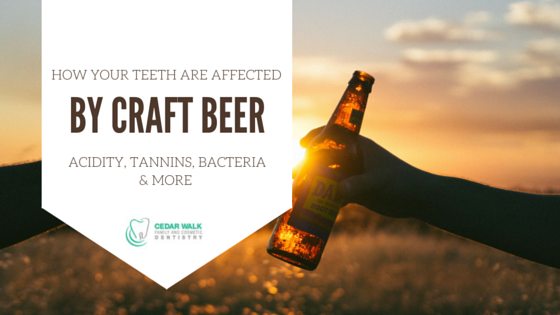Craft Beer’s Impact on Your Mouth

NASCAR Experience with Carolinas Center for Oral and Facial Surgery
June 7, 2016
Family Trip to Hilton Head
July 28, 2016Craft Beer’s Impact on Your Mouth
 Dr. Prashant Rao, DDS, a Charlotte native and NYU-trained dentist, specializes in esthetics, dental implants, and preventative dentistry.
Dr. Prashant Rao, DDS, a Charlotte native and NYU-trained dentist, specializes in esthetics, dental implants, and preventative dentistry.

For those of us celebrating summer in Charlotte, chances are you’re dental health is the last thing running through your mind. According to some research, there could be cause for concern depending on your beer habits. For those that are concerned with keeping that pearly white smile, how exactly does beer affect your teeth?
Problems with Stout
For those that like their stouts, these darker beers contain roasted malts and barley that have a tendency to stain the teeth. These beers aren’t only strong in flavor, but also have a concentrated, dark color. Unfortunately, that color rubs off on teeth causing them to take on a shade of grey, blue or yellow over time. Stout beers are often brewed with dark berries and plums for flavor which are also full of natural staining agents.
Dark beer lovers could eventually show signs of staining, giving the appearance of age and poor oral hygiene. Even if you brush and floss regularly or undergo teeth whitening treatments, the staining effect can still be strong enough to darken your teeth.
Acids in Beer
Through a process known as demineralization, your tooth enamel can be worn away by the acidity of beers. Drinks with a pH of 5.5 are acidic enough to start the process and with craft beers having a pH in the range of 5.4-5.8, you can be sure to have some erosion occurring.
Sour tasting beers such as the Belgian range of lambics, gueuze and Flanders red ales are known for lying at the low (acidic) end of the pH scale. Regular drinking of sour beers are much more harmful to dental health, as they can have a pH as low as 3.2–3.3.
For anyone that suffers from very severe hangovers the morning after, you could be giving your teeth enamel a double thrashing: stomach acid levels hover around the pH 2.0 mark.
Is Beer Good for You?
It’s not all gloom and doom when it comes to your favorite drink. Craft beers that are predominantly made from barley and hops contain high levels of silicon and calcium, both of which are good for strong bones, teeth, nails and hair.
Hops have also been shown to have antibacterial properties and deter development of microorganisms in the mouth. There is also such a thing as good acids, known as tannins, which have similar properties to fluoride found in toothpaste and help to prevent bacteria attaching to teeth.
What’s the Verdict?
Ultimately, the same rule applies as with everything in life: all things in moderation. Just because beer can stain your teeth or wear away tooth enamel doesn’t mean you have to give it up for good. If you consume a sensible amount of beer and also take good care of your teeth with brushing, flossing and routine trips to your dentist, then you have nothing to worry about.
Practice Recognitions
Recent Posts
- How Long Do Same-Day Crowns Last?
- Top Cosmetic Dental Procedures: Start 2025 With a New Smile
- What is a Zirconia Crown
- How To Know If You Need a Root Canal
- Invisalign FAQ: Your Top Questions Answered!
- Invisalign vs. Smile Direct: What Is The Difference?
- Itchy Gums: Causes, Relief, and Prevention
- The Benefits of Dental Implant Surgical Guides
- Wisdom Teeth Removed: 5 Signs You May Need to Remove Yours
- Tips For Wisdom Teeth Pain Relief: All You Need To Know




